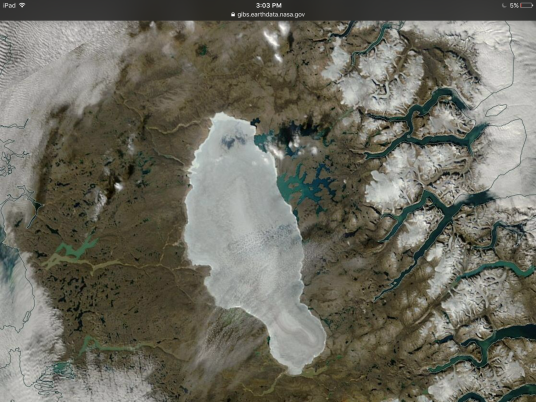Arctic Entering Its Hottest Period in 2.5 Million Years as Last Remnants of Laurentide Melt Away
23
March, 2017
There
are many ways to tell the Earth’s temperature. One is by measuring
how warm the atmosphere is near the surface. Another is to track the
heat content of the world’s oceans. Still another is by taking
account of melting glaciers and comparing thaw lines with times in
the geological past.
And
according to new research,
the present state of the Barnes Ice Cap — which is the last tiny
remnant of the once vast Laurentide
Ice Sheet — tells
a tale of heat not seen in 2.5 million years.
(NASA
satellite shot of
the last melting remnant of the Laurentide Ice sheet on August 30 of
2016. Want to see a time lapse of Barnes Ice Cap melt from 1984 to
2015? Take
a look at this GoogleEarth time lapse,
zoom in on Baffin Island, find the ice cap, and watch the edge lines
retreat. It’s a bit uncanny..)
Over
the past 2.5 million years, the Laurentide Ice Sheet has swelled and
shrunken as cold ice ages were followed by warm interglacials. During
the height of each ice age, the glaciers of Laurentide expanded to
cover most of present day Canada and parts of the Northern United
States. And during warmer interglacials, the ice sheet retreated to
its final stronghold of the Barnes Ice Cap on Baffin Island.
But
now, scientists have found that the
Barnes Ice Cap, and with it the last remains of the Laurentide Ice
Sheet, is about to disappear.
Projections indicate that the considerable warming the Arctic is now
experiencing, due primarily to fossil fuel burning, will completely
melt this half-a-kilometer tall mountain of ice in just 200 to 500
years.
(Recent
decline of the Laurentide Ice Sheet during the end of the last ice
age to 1,000 years before present. Soon, this once great mass of ice
will be completely lost. Yet one more casualty of human fossil fuel
burning.)
Once
that happens, the Laurentide Ice Sheet will be gone. And
this will be the first time such a thing has happened in 2.5 million
years. The
study authors further note that even if fossil fuel burning were to
stop now, that the total loss of this ice would still occur. What
this means is that some parts of the Arctic are now likely as hot or
hotter than they were at any time in the last 2.5 million years.
And, as
the World Meteorological Organization noted so cogently this week, it
also means that we’re heading deeper and deeper into uncharted
territory when it comes to climate.
Links:
Hat
tip to Colorado Bob
Hat
tip to Keith Antonysen
Hat
tip to Kevin




No comments:
Post a Comment
Note: only a member of this blog may post a comment.